A long-standing federal food assistance program could be short $1 billion next year, leaving 2 million parents and young children without access to its support, a report from the Center for Budget and Policy Priorities said Tuesday.
The center-left think tank called on Congress to allocate more funding for the Special Supplemental Nutrition Program for Women, Infants and Children, commonly known as WIC, citing a higher-than-expected demand in an economy whose surprising strengths haven’t fended off a post-pandemic hunger crisis.
“Congress has failed to provide WIC with the additional funding it needs to avoid turning away eligible young children and pregnant and postpartum adults with low incomes for the first time in decades,” Ty Jones Cox, the vice president for food assistance policy for the Center for Budget and Policy Priorities, or CBPP, said on a conference call Tuesday.
The stopgap funding bill President Joe Biden signed on Nov. 17 to head off a government shutdown included $6 billion in WIC funding for 2024. But CBPP projects that the program will need up to $7.3 billion to meet the expected demand, and lawmakers have until the next budget deadline of Jan. 19 to lock in additional money.
“Congress shouldn’t let us even come this close to this point,” Cox said. “We are a wealthy nation that can afford to make sure toddlers have milk and vegetables.”
More than half of all infants in the U.S. receive benefits through the WIC program, which provides supplemental nutrition aid, counseling and referrals to other services.
“The urgency for action cannot be overstated,” said Georgia Machell, interim president and CEO of the National WIC Association. “Ensuring WIC’s long-term stability and maintaining the trust of its participants hinge on Congress’ willingness to bolster its support.”
A spokesperson for the Agriculture Department, which administers WIC, called the CBPP report “one more piece of evidence that without the necessary additional funding, millions of eligible pregnant women, new mothers, infants and young children are at risk of missing out” on critical aid. The spokesperson said the White House is holding a media call Wednesday to highlight the issue.
Policy experts said WIC’s funding needs have grown in recent years due to rising food costs and the expiration of pandemic-era benefits that had fortified Americans’ wallets and refrigerators. In 2022, the USDA found that 12.8% of households were food-insecure, up from 10.2% in 2021.
Demands on WIC would be even greater if more eligible Americans used it. The USDA has said the program reaches just over half of those who qualify, citing lack of awareness and recipients’ difficulties in attending required appointments. This fiscal year, WIC participation hit 6.57 million people, around 178,000 more than in 2019, according to USDA records.
Monthly costs per participant have risen, too, from $40.90 per person in 2019 to $55.95 today. The CBPP said that the end of emergency SNAP benefits earlier this year and the lapse of the expanded Child Tax Credit contributed to driving up WIC rolls.
A budget shortfall could lead the WIC agencies that administer the program at the state level to set up waiting lists or reduce the support they’re able to offer, the CBPP said.
The think tank’s report comes as high prices for many grocery items leave many households struggling to put food on the table. While inflation has slowed and some prices are coming down, the cost of food consumed at home was 1.7% higher in November than the year before, with staples like cereal and bakery products up 3.4% and fresh ground beef up 7.2%, according to federal data released Tuesday.
Taylor Moyer, a mother of three in Virginia Beach, Virginia, said WIC keeps her from having to decide between household essentials like soap and fresh produce for her kids.
“If this were to be taken away from us, that means that our babies don’t get that baby food or our babies don’t get that formula,” Moyer said. “It’s scary.”
WIC has also filled a knowledge gap for her family.
“When I didn’t have anybody to ask, ‘Hey, what am I doing wrong while breastfeeding?’ they have those lactation consultants that can help,” she said.
Republicans have pushed back on calls to raise WIC funding, with House conservatives seeking cuts to the program during talks for the stopgap measure last month.
Sen. Roger Marshall, R-Kan., said he was “proud to champion the WIC program in a bipartisan manner” throughout his time in Congress, but called to “adjust the policy for a nation in recovery” from the disruptions of Covid-19. “Now that the pandemic is over, we must retool the program to reflect the current economy,” he said.
Sen. Bob Casey, D-Pa., disagreed. “If the spending bill includes draconian cuts to WIC proposed by Republicans, then millions of parents and young children risk losing access to healthy foods they need and deserve,” said Casey, who earlier this year introduced a bipartisan bill to expand WIC eligibility for children until their sixth birthday or first day of kindergarten, among other provisions.






























